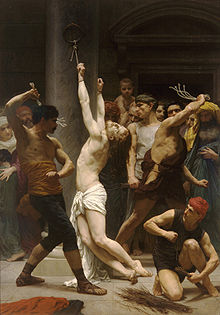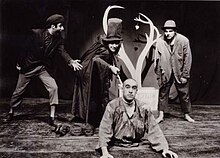Kenneth Tynan
Appearance

Kenneth Tynan (2 April 1927 – 26 July 1980) was a British theatre critic, author and literary manager of London's National Theatre Conmpany for a decade from 1963.
Quotes
[edit]

- A good many inconveniences attend playgoing in any large city, but the greatest of them is usually the play itself.
- Article in the New York Herald Tribune (17 February 1957)
- Useless, of course, to point out that the genesis of good plays is hardly ever abstract; that it tends, on the contrary, to be something as concrete and casual as a glance intercepted, a remark overheard, or an insignificant news item buried at the bottom of page three. Yet it is by trivialities like these that the true playwright's blood is fired. They spur him to story-telling; they bring on the narrative fit that is his glory and his basic credential. Show me a congenital eavesdropper with the instincts of a peeping Tom, and I will show you the makings of a dramatist. Only the makings, of course: curiosity about people is merely the beginning of the road to the masterpiece: but if that curiosity is sustained you will find, when the rules have been mastered and the end has been reached, that a miracle has happened.
- Pausing on the Stairs (1957)
- Lenny Bruce ... [is] the most original, free-speaking, wild-thinking gymnast of language this inhibited island has ever engaged to amuse its citizens.
- [A]t the end he had broken through frontiers of language and feeling that one had hitherto thought inviolable ...
- "Look Back in Quadruplicate" The Observer (London, 29 April 1962) p. 29
- I believe in neither a director’s nor a writer’s theatre, but a theatre of intelligent audiences. I count myself as a member of an intelligent audience, and I wrote to you as such. That you should disagree with me I can understand, but that you should resent my expressing my opinions is something that frankly amazes me. I thought we had outgrown the idea of theatre as a mystic rite born of secret communion between author, director, actors and an empty auditorium.
- Letter to George Devine (10 March 1964), printed in Kenneth Tynan : A Life by Dominic Shellard , p. 292
- I doubt if there are very many rational people in this world to whom the word "fuck" is particularly diabolical or revolting or totally forbidden.
- Spoken during a discussion on censorship, broadcast live on the BBC program BBC-3, (13 November 1965) Tynan is usually considered the first person to say this word on British television, leading to an apology from the BBC and several motions in the House of Commons.
- Any country that has sexual censorship will eventually have political censorship.
- I hope I never need to believe in God. It would be an awful confession of failure.
- As quoted in "Critic Kenneth Tynan Has Mellowed But Is Still England's Stingingest Gadfly" by Godfrey Smith in The New York Times (9 January 1966)
- A critic is a man who knows the way but can't drive the car.
- As quoted in "Critic Kenneth Tynan Has Mellowed But Is Still England's Stingingest Gadfly" by Godfrey Smith in The New York Times (9 January 1966)
- No theater could sanely flourish until there was an umbilical connection between what was happening on the stage and what was happening in the world.
- As quoted in "Critic Kenneth Tynan Has Mellowed But Is Still England's Stingingest Gadfly" by Godfrey Smith in The New York Times (9 January 1966)
- A neurosis is a secret that you don't know you're keeping.
- As quoted in The Life of Kenneth Tynan (1987) by Kathleen Tynan, p. 188
Curtains (1961)
[edit]- Curtains: Selections from the Drama Criticism and Related Writings (1961)
- Art and ideology often interact on each other; but the plain fact is that both spring from a common source. Both draw on human experience to explain mankind to itself; both attempt, in very different ways, to assemble coherence from seemingly unrelated phenomena; both stand guard for us against chaos.
- William Congreve is the only sophisticated playwright England has produced; and like Shaw, Sheridan, and Wilde, his nearest rivals, he was brought up in Ireland.
- The unique thing about Margaret Rutherford is that she can act with her chin alone. Among its many moods I especially cherish the chin commanding, the chin in doubt, and the chin at bay.
- Not content to have the audience in the palm of his hand; he goes one further and clinches his fist.
- On singer Frankie Laine
Tynan Right and Left (1967)
[edit]

- Tynan Right and Left : Plays, Films, People, Places and Events (1967)

- If a play does anything either tragically or comically satirically or farcically — to explain to me why I am alive, it is a good play. If it seems unaware that such questions exist, I tend to suspect that it's a bad one.
- Foreword
- A good drama critic is one who perceives what is happening in the theatre of his time. A great drama critic also perceives what is not happening.
- Foreword
- John Osborne spoke out in a vein of ebullient, free-wheeling rancour that betokened the arrival of something new in the theatre — a sophisticated, articulate lower-class. Most of the critics were offended by Jimmy Porter, but not on account of his anger; a working-class hero is expected to be angry. What nettled them was something quite different: his self-confidence. This was no envious inferior whose insecurity they could pity.
- "Decade in Retrospect: 1959" (1959), p. 13
- People have always needed art: but why have they needed it? And what shaped the forms by which they satisfied their need? … In the arts form tends to be conservative, and content to be revolutionary; it is novelty of content that precedes, demands and imposes novelty of form.
- Review of The Necessity of Art (1959) by Ernest Fischer
- When you've seen all of Ionesco's plays, I felt at the end, you've seen one of them.
- Review of Victims of Duty by Eugène Ionesco (1960), p. 36
- A villain who shares one's guilt is inevitably more attractive than a hero convinced of one's innocence.
- Review of The Changeling, by Thomas Middleton (1961), p. 75
- We shall be judged by what we do, not by how we felt while we were doing it.
- Review of Altona, by Jean-Paul Sartre (1961), p. 97
- The man who reacts to the universe with a cry of impotent anguish is acceptable as an artist only if he can persuade us that he has sanely considered the other possible reactions and found them inadequate.
- "Anatomy of the Absurd" (1962), p. 104
- How far should one accept the rules of the society in which one lives? To put it another way: at what point does conformity become corruption? Only by answering such questions does the conscience truly define itself.
- Review of Le Misanthrope, by Molière, at the Piccadilly (1962), p. 117
- When a society has doubts about its future, it tends to produce spokesmen whose main appeal is to the emotions, who argue from intuitions, and whose claim to be truth-bearers rests solely on intense personal feeling.
- Review of After the Fall, by Arthur Miller, at the ANTA Washington Square Theatre, New York; Blues for Mister Charlie, by James Baldwin at the ANTA Theatre, New York (1962), p. 143
- I attacked those Western playwrights who use their influence and affluence to preach to the world the nihilistic doctrine that life is pointless and irrationally destructive, and that there is nothing we can do about it. Until everyone is fed, clothed, housed and taught, until human beings have equal leisure to contemplate the overwhelming fact of mortality, we should not (I argued) indulge in the luxury of "privileged despair."
- "Conference at Edinburgh" (1963), p. 146
- Does the critic wish to influence the kind of film that costs more than £250,000? It is as if he were to send a postcard to General Motors explaining that he would like them to make a raft next year, or a helicopter, instead of a car.
- "Footnote on Cinema" (undated), p. 260
- Everyone is vulnerable who is at once gifted and gregarious.
- "Orson Welles" (1961), p. 297
- Judge and prosecutor had hammered it home that Lady Chatterly was an immoral woman, that she had had sexual relations before marriage, that she had committed adultery under her husband's roof; as if these charges somehow disqualified her from participation in serious literature. Indeed, there were long periods of the trial during which an outsider might well have assumed that a divorce case was being heard.
- "Lady Chatterly's Trial (The Old Bailey, 20 October - 2 November 1960)", p. 409
- The buttocks are the most aesthetically pleasing part of the body because they are non-functional. Although they conceal an essential orifice, these pointless globes are as near as the human form can ever come to abstract art.
- "Meditations on Basic Baroque," IV (1966), p. 432
Profiles (1990)
[edit]
- edited by Ernie Eban
- One would have thought that the notion of an impersonal critic was as patently absurd as that of an impersonal person: yet playwrights still cherish it as a sort of holy ideal. Admittedly, we all make mystiques: but this one is particularly wishful. The man who asks for an anonymous, impersonal criticism is trying to elevate criticism to the status of a science; whereas it is, I am afraid, only an art. The critic's business is to write readable English: the playwright's to write speakable English. Beyond that it is every man for himself.
- "George Jean Nathan" (1953), p. 61
- Welles is at once as abnormal and as natural as Niagara Falls.
- "Orson Welles" (1953), p. 65
- What, when drunk, one sees in other women, one sees in Garbo sober.
- "Greta Garbo" (1954), p. 79
- All writing is an antisocial act, since the writer is a man who can speak freely only when alone; to be himself he must lock himself up, to communicate he must cut himself off from all communication; and in this there is something always a little mad.
- "Tennessee Williams" (1956), p. 97
- In most writers, style is a welcome, an invitation, a letting down of the drawbridge between the artist and the world. Shaw had no time for such ruses. Unlike most of his countrymen, he abominated charm, which he regarded as evidence of chronic temperamental weakness.
- "Bernard Shaw" (1956), p. 102
- His puritan, muscular, moor-tramping soul (superbly mirrored in Higgins's hymn to the intellect in Pygmalion) bred in him a loathing of all things, whether poems or gadgets, that were designed to comfort the human condition without actively trying to improve it.
- "Bernard Shaw," p. 103
- Every speech, for Olivier, is like a mass of marble at which the sculptor chips away until its essential form and meaning are revealed. No matter how ignoble the character he plays, the result is always noble as a work of art.
- "Laurence Olivier" (1966), p. 208
- Her style looks absurdly simple — an effortless act of projection, a serpentine lasso whereby her voice casually winds itself around our most vulnerable fantasies. But it is not easy. It is what remains when ingratiation, sentimentality and the manifold devices of heart-warming crap have been ruthlessly pared away. Steel and silk are left, shining and durable.
- "Marlene Dietrich" (1967), p. 215
- She shows herself to the audience like the Host to the congregation.
- "Marlene Dietrich," p. 217
Misattributed
[edit]- Art is a private thing, the artist makes it for himself; a comprehensible work is the product of a journalist. We need works that are strong, straight, precise, and forever beyond understanding.
- From Dada Manifesto 1918 (23 March 1918) by Tristan Tzara
- I do not see the EEC as a great love affair. It is more like nine middle-aged couples with failing marriages meeting at a Brussels hotel for a group grope.
- "This going into Europe will not turn out to be the thrilling mutual exchange supposed. It is more like nine middle aged couples with failing marriages meeting in a darkened bedroom in a Brussels hotel for a group grope." - E.P. Thompson, "On the Europe Debate," The Times of London (27 March 1975) [1]
- It is the nature of ambition to make men liars and cheats, to hide the truth in their breasts, and show, like jugglers, another thing in their mouths, to cut all friendships and enmities to the measure of their own interest, and to make a good countenance without the help of good will.
- Sallust, Bellum Catilinae, X, 5. This particular translation of the original Latin is from the essay "On Liberty" by Abraham Cowley: "Sallust, therefore, who was well acquainted with them both and with many such-like gentlemen of his time, says, 'That it is the nature of ambition' (Ambitio multos mortales falsos fieri coegit, etc.) 'to make men liars and cheaters; to hide the truth in their breasts, and show, like jugglers, another thing in their mouths; to cut all friendships and enmities to the measure of their own interest, and to make a good countenance without the help of good will.'" [2] The Wikiquote page for Sallust has the quote and a different translation.
Quotes about Tynan
[edit]- The hero of Tynan Right and Left is, as the title suggests, Tynan. The ostensible subject matter is of course wider, for the book consists of Tynan's writing over the past 10 years, not only in his capacities as theater and cinema reviewer but also as the author of occasional pieces, interviews and essays on a wide variety of people … But whatever he is writing about Tynan never forgets the subject on which he is the leading world expert: namely Kenneth Tynan, cultural journalist, moralist, socialist. "Occupation: opinion-monger observer of artistic phenomena, amateur ideologue."
- Richard Boston, in his review of Tynan Right and Left, "Tynan Right and Wrong", in The New York Times (10 December 1967)
- Tynan's interests cover an unusually broad range, and his references are equally wide: How many other critics would quote Seneca on Humphrey Bogart or Coleridge on the Beatles? … As a theater critic he has been extremely influential, and always in useful directions. Sometimes his concern for the state of contemporary drama leads him to overestimate particular plays for their tactical importance in the struggle for the sort of theater he would like to see … the state of British theater is far healthier now than it was when Tynan first appeared on the scene, and for this he can take some credit. … Like all good critics sooner or later, he has come up against the form and content argument, and like all good critics (at least when it is put in either-or terms) he comes down on the side of content. … Like George Orwell he has the ability always to pick on the important issues even when briefly reviewing a film or play which is in itself of little interest. He raises the right questions even if he does not always come up with the right answers, and usually he does come up with the right answers. Almost without exception he is readable and stimulating, whatever the subject; he is very honest, and often funny. If he is too interested in himself, there are after all a lot of people who are much less interesting.
- Richard Boston, in "Tynan Right and Wrong", in The New York Times (10 December 1967)
- Ken, the Tot of Destiny, had turned into the Marquis de Sade, and I in response had become a virago.
- Elaine Dundy, on the deterioration of her marriage to Tynan, as quoted in her Obituary in The Telegraph (6 May 2008)
External links
[edit]- "Featured Author: Kenneth Tynan", New York Times archives

